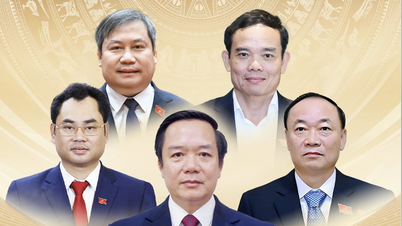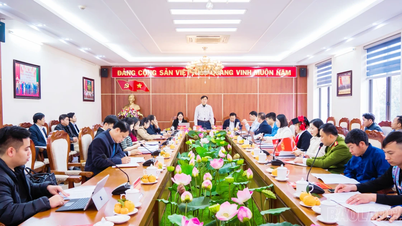Regulation No. 377 of the Politburo on decentralization of cadre management and planning, appointment, nomination, suspension, dismissal, resignation, and dismissal of cadres has just been issued.
The dismissal, resignation, and removal from office of officials is one of the important contents addressed in Regulation No. 377.
In principle, the Politburo requires timely consideration of dismissal, resignation, and removal of officials when there is sufficient basis. “Do not remove officials from their positions or resign them if they are in a position to be dismissed,” Regulation 377 clearly states.
The Politburo also encourages officials to voluntarily resign from their positions when they do not meet job requirements, no longer have enough prestige, or their violations do not warrant dismissal.
Cases under consideration for official resignation
According to the Politburo's regulations, heads of agencies and units may be considered for removal from office (except in cases of force majeure or when the head has held the position for less than one year) if the locality, agency, or unit completes less than 70% of the targets and tasks according to the program and plan for the year, or fails to complete 5 basic socio -economic targets…
Officials who are responsible (except in cases of force majeure) will also be considered for dismissal if, according to the assessment of the competent authority, the results of fulfilling assigned targets and tasks regarding Party building, institutional building, socio-economic development, national defense and security, etc., are not met…

Panorama of the 12th Central Conference (Photo: Doan Bac).
Consideration for removal from office also applies to bureaucratic officials who are distant from the people and do not promptly resolve the opinions, wishes, interests, legitimate and legal complaints and denunciations of the people and businesses.
Officials who are held responsible for allowing prolonged and complex hotspots to occur, and who are concluded by competent authorities to have serious consequences; or officials who are irresponsible and fail to promptly address serious violations by officials and Party members under their direct management… will also be considered for removal from their positions.
Regarding resignation, the Politburo stipulates that officials who voluntarily request to resign will be considered for resignation if one of the following grounds is met:
(1) Because I realize that I have limitations in leadership and management ability or no longer have enough credibility to fulfill the assigned responsibilities and tasks.
(2) There are more than 50% of the votes of no confidence in the prescribed voting period.
(3) For other personal reasons.
(4) Being the head of an agency or unit under direct management or direct supervision where serious corruption, waste, or negativity occurs, but not to the extent that disciplinary action must be considered and taken according to regulations.
(5) During the term of office, there were two non-consecutive years in which the performance rating was not achieved.
(6) Having committed violations of political qualities, ethics, and lifestyle, and being concluded and evaluated by competent authorities causing public outrage and negatively affecting the reputation of organizations and individuals.
(7) Allowing spouses and children to violate the laws of the State; fall into social evils and be concluded and evaluated by competent authorities causing public outrage, negatively affecting the reputation of oneself and the agency/unit.
(8) Allowing others to take advantage of one's position and authority for personal gain and being concluded and evaluated by competent authorities as causing serious consequences, public outrage, and negatively affecting personal and organizational reputation (except in cases where one is unaware) .
(9) Not daring to do, not daring to take responsibility, shirking, avoiding responsibility, not performing work within their authority according to assigned functions and tasks, and being concluded and evaluated by competent authorities as causing very serious consequences, bad public opinion, and resentment among cadres, party members and the people.
In the case mentioned in point (2) above, if the officer does not voluntarily resign, the competent authority shall consider removing him/her from office.
In the cases mentioned in points (4), (5), (6), (7), (8), (9) above, if the official does not voluntarily resign, the competent authority shall consider dismissing him.
Cases of dismissal
Regarding dismissal, the Politburo clearly stipulates a number of cases:
- Disciplined with a warning and assessed by competent authorities as having limited capacity, reduced reputation, and unable to continue holding the assigned position.
- Being disciplined with reprimand related to assigned duties and tasks 2 times or more during a term or appointment period.
- There are more than 2/3 of the low confidence votes at the voting period as prescribed.
- Having been rated as failing to complete assigned tasks for two consecutive years (related to the performance of assigned duties and responsibilities).
- Being found by competent authorities to have deteriorated in political ideology, morality, and lifestyle, undergoing "self-evolution" and "self-transformation"; violating the rules that Party members are not allowed to break; violating the responsibility of setting an example, causing public outrage, and negatively affecting the reputation of oneself and the agency or unit where one is working.
- Concluded by a competent authority to have violated political standards according to regulations on internal political protection of the Party to the extent of being dismissed.
- Being the head of an agency or unit under his/her direct management or responsibility or directly subordinates, causing corruption, waste, and negativity, causing very serious consequences according to the conclusion of a competent authority, but not to the extent that disciplinary action must be considered and handled according to regulations.
- Being the head of an agency or unit under direct management or responsibility, causing serious conflicts and disunity according to the conclusion of a competent authority.
- Violating Party regulations and State laws to the extent of being dismissed upon recommendation of competent authorities.
According to the regulations of the Politburo, the authority with the authority to appoint and introduce candidates for election according to regulations has the authority to consider and decide to allow officials to cease holding positions, resign, or dismiss.
For cadres under the decision-making authority of superiors, the Party Committee, Party organization, and collective leadership shall report to the agency or unit employing the cadre to propose to the competent authority to remove them from office, resign, or dismiss them.
Source: https://dantri.com.vn/thoi-su/bo-chinh-tri-can-bo-quan-lieu-xa-dan-co-the-bi-cho-thoi-giu-chuc-vu-20251017112307907.htm












































































































Comment (0)